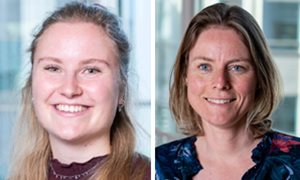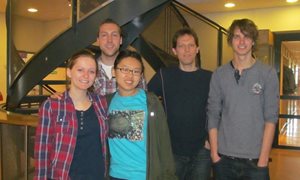15 October 2019
b) Theater or cinema? : Theater
c) Dine out or dine in? : Dine out
d) Ferrari or Fiat? : Ferrari
e) Shopaholic or chocoholic? : Chocoholic
f) Culture or Nature : Nature

My name is Maroeska te Loo, medical staff member of Pediatric Hematology at the department of Pediatrics of the Amalia Childrens Hospital. I am currently working in the theme Rare cancers.
When you were a kid, what did you want to be when you grew up? Can you tell us something about your child years?
"As a child I wanted to become an archaeologist. I thought it was wonderful to go outside and look for shards, old things and then make a whole of it. When I was 10, however, my mother developed cancer and became very ill. At some point in time, the doctors thought she would die and I had to say goodbye as a 10-year-old. I did not understand the impact and asked what I could do to help. The intensivist indicated that I was still too small to help large people and to understand the problems there where. From that moment on, I only wanted one thing: to become a doctor to help small people. I never let go of that thought again and through high school, medical school etc. I only wanted to become a pediatrician that would make the difference. I still look for pieces, however, the pieces that I am looking for are: learning more about the pathogenesis of diseases and finding new solutions for treatment or improve current treatment."What was your previous academic training, where did you study and why that study?
"As mentioned above I already knew as a child that I wanted to become a pediatrician. For this, I studied medicine in Nijmegen, followed by my PhD thesis on Hemolytic uremic syndrome in pediatrics. Subsequently, I started my training to become a pediatrician first and later a pediatric hematologist and oncologist. During my fellow period as pediatric hematologist I received my first personal grant to study pharmacogenetics of osteosarcoma. Knowledge regarding pharmacological aspects forms the corner stone of my research. For this reason I started my training as clinical pharmacologist in 2009."The RIMLS motto is: ‘Today’s molecules for tomorrow’s medicine’. What does this mean for you?
"Based on the genetic profiles of the diseases of the patients I hope to find new druggable targets. And by using pharmacogenomics I hope to improve current treatment strategies to enhance efficacy and reduce adverse events seen in patients."Who is your great example as scientists? And why?
"In fact my greatest example was my promotor prof. Leo Monnens PhD. He was always working to improve medical care of children and always linked the clinic with scientific research and vice versa. His integrity, his enthusiasm and his personal care have always been a great example for me."Which research discovery that you have made has made you most proud?
"At this moment we are performing a clinical trial with the drug Sirolimus in patients with a congenital vascular malformation that had no other treatment options anymore. Patients with these vascular malformation suffer of severe pain due local increased coagulation and infections. Sirolimus is a drug that inhibits the mTOR pathway, which is upregulated in these patients due mutations in the PIK3CA pathway. By inhibiting the mTOR pathway we hoped to make a difference for this patients. The trial with Sirolimus runs now for several years: for me, it is still a wonder to see how life of about 70% of the patients have changed by introducing Sirolimus. 70% of the patients has less or even no pain anymore, quality of life improved significantly and patients can participate in normal daily activities. Interestingly, in 30% of the patients we observed a reduction in the size of the vascular malformation."Given unlimited finance what experiment would you perform?
"That is a difficult question as I would not perform only one experiment. I have a lot of ideas how to improve current medical treatment in pediatrics for example by introducing an nationwide pharmacovigilance system and pharmacogenetic testing. On the other hand I would like to unravel more about the pathogenesis of the vascular malformations, gain insight why there is local intravascular coagulation and which factors contribute. Furthermore, I would like to gain insight in the genetic signature of these vascular malformations to find new druggable targets."What does your working area look like and what does it say about you or your research?
"My work area is very clean and organized. I like to be organized in both my medical tasks and my research."Nominate a colleague to be in the spotlight:
"Marieke Coenen, department of Genetics."What type of person are you? Quick insights:
a) Mac or PC? : Macb) Theater or cinema? : Theater
c) Dine out or dine in? : Dine out
d) Ferrari or Fiat? : Ferrari
e) Shopaholic or chocoholic? : Chocoholic
f) Culture or Nature : Nature
Related news items

Combining targeted radionuclide therapy and immune checkpoint inhibition for cancer treatment
4 May 2022 Simone Kleinendorst, Sandra Heskamp and colleagues, theme Rare cancers, published in Clinical Cancer Research about their research on combined radionuclide therapy and immunotherapy for cancer treatment. go to page
New method improves diagnostics of lymphoma
10 December 2021 Blanca Scheijen and Patricia Groenen of the Department of Pathology, together with a European consortium, developed a diagnostic method that more clearly distinguishes between inflammation and lymphoma in enlarged lymph nodes. go to page
Million Euros to develop therapy against cancer metastasis in bones
22 November 2021 In the PlatiBone project, researchers Sander Leeuwenburgh and Sandra Heskamp will test new drugs that combine diagnostics, chemotherapy and radiation go to page
RIMLS awards call for nominations
19 October 2021 RIMLS awards several prizes to stimulate and honor our (young) researchers. Upcoming awards are Supervisor of the Year, Best Master Thesis, Best Publication, Best Image and more. Send your nominations now before 24 November 2021. go to page
Tackling cancer with radioactive particles
2 September 2021 Professor Sandra Heskamp receives grant for research into cancer treatment with radioactivity go to page
